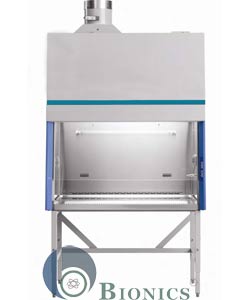The Must Know Details and Updates on microbiological safety cabinet
The Must Know Details and Updates on microbiological safety cabinet
Blog Article
Enhancing Laboratory Safety with Class 2 Biosafety Cabinets and Microbiological Protection

Maintaining a safe lab environment is crucial in today’s advanced research and clinical setups. Whether it's handling live pathogens or sensitive diagnostics, biosafety cabinets are central to preventing cross-contamination and safeguarding personnel.
Of all types, Class 2 cabinets are most commonly used due to their efficiency and versatility. These units are essential for labs working with infectious materials or clinical diagnostics.
Biosafety Cabinets – How They Work and Why They Matter
Biosafety cabinets are specially designed, enclosed systems that ventilate and filter lab air. They use high-efficiency filters to purify air entering and leaving the cabinet.
These units are generally classified into three categories—Class I, Class II, and Class III. Among these, Class II units strike a balance between user, product, and environmental protection.
Defining Class 2 Biosafety Cabinets and Their Role
Class 2 Biosafety Cabinets offer simultaneous protection for people, processes, and surroundings. They direct filtered airflow in a laminar pattern over the work surface.
Air is treated using dual filtration systems to ensure safe circulation and exhaust. These cabinets are suited for clinical, research, and pharmaceutical lab applications.
Key Features of Microbiological Safety Cabinets
A Class 2 microbiological safety cabinet includes several integrated safety mechanisms such as:
• HEPA/ULPA filtration to trap microbes and particles
• Uniform downward airflow to protect the sample zone
• Inward airflow to keep aerosols contained
• Built-in UV sterilisation for decontaminating surfaces
• Low sound emissions to reduce fatigue
• Front glass for full control and protection
These elements support lab workers in maintaining sterile working environments.
Where Class 2 Cabinets Are Used
Class 2 Biosafety Cabinets are widely deployed in clinical labs, vaccine R&D, and academic research. They are ideal for safe handling of samples during testing and experimentation.
Whether in hospitals or drug manufacturing, these units are essential for clean procedures.
Advantages of Installing Class 2 Cabinets in Your Lab
Using Class 2 cabinets offers multiple advantages including operator protection and experimental reliability:
• Reduces the risk of sample cross-contamination and error
• Acts as a barrier between user and biohazard
• Improves environmental safety by filtering outgoing air
These cabinets help labs meet safety regulations while maintaining workflow.
Cabinet Types and Global Compliance
Top manufacturers ensure their cabinets meet certifications like NSF 49, EN 12469, and WHO recommendations. Class 2 units are sub-classified as A1, A2, B1, and B2—based on varying airflow balance and ducting needs.
• Type A2: Recirculates 70% and exhausts 30% of filtered air
• Type B2: Exhausts 100% of air via ducting; no recirculation
Selecting the right configuration ensures compliance and safety.
Tips for Purchasing the Ideal Biosafety Cabinet
Before purchasing, consider:
• Your application type (e.g., diagnostics, pharma, research)
• Available lab space and utility infrastructure
• Ease of use, energy efficiency, and upkeep
• Warranty, training, and certification services
Working with reliable manufacturers provides peace of mind and technical guidance.
Best Practices for Using Class II Biosafety Cabinets
For optimal results:
• Minimise airflow interference during operation
• Get periodic validation from certified technicians
• Educate staff on cabinet operations and safety
Operational best practices include:
• Use gloves, gowns, and face shields while operating
• Work calmly to prevent airflow disturbances
• Decontaminate surfaces before and after use
• Use UV lights only when cabinet is off and unoccupied
Why Class 2 Cabinets Are a Must-Have in Labs
Class 2 biosafety cabinets are essential for labs that value safety, precision, and Biosafety Cabinets cleanliness. They ensure contamination-free experiments and personnel safety.
From biotech and diagnostics to academia and pharma, Class II cabinets maintain sterility in sensitive procedures. When investing in a biosafety cabinet, prioritise compliance, usability, and long-term support—because your research deserves the best protection. Report this page